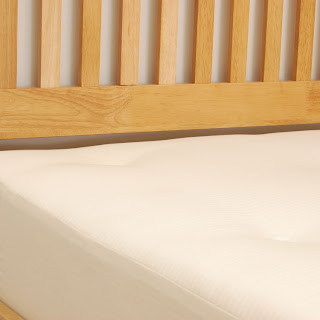
Organic natural latex mattresses can provide a new level of health and wellbeing, simply not available with its non-organic brother. Whether you have particularly sensitive skin, allergies, back problems or problems with overheating, an organic mattress can help you achieve a peaceful night’s sleep. There are many types of organic mattresses, all with varying organic components and benefits. As well as having tremendous health benefits, organic natural latex mattresses boast a much more environmentally friendly and sustainable set of ingredients.
Organic Mattresses - click here to browse our full range of products.
What Makes an Organic Mattress Organic?



The definition of an organic mattress is a mattress which is made up entirely of organically certified components (where a certification exists). The popularity of organic mattresses had lead to some manufacturers selling a mattress as ‘organic’ when, in fact, not all of the components are organic. When shopping for a mattress (especially online) look out for the ‘Soil Association Organic’ and ‘Global Organic Textile Standard ‘ certification marks.
A mattress is, of course, made from different components, all of which need to have come from an organic source. Unlike the organic fruit and vegetables which you will find at your local supermarket, a mattress has many different components. It is important to know where each part of the mattress came from, in order to ensure quality and that it has gone through a completely organic manufacturing process.
The Benefits of an Organic Mattress
When it comes to mattresses, one the most common reasons people choose to go organic is to avoid the potentially harmful chemicals harboured by synthetic, non-organic mattresses. The main argument for organic food is that the chemical pesticides and insecticides used on the crops are not meant for human consumption, and could potentially harm your health further down the line. The cotton in a non-organic mattress is one of the most pesticide-heavy fabrics on the planet. Roughly 25% of all chemical pesticide is used on cotton.An organic mattress doesn’t just have long-term health benefits; it gets to work right away. Many people who suffer from sensitive skin can find it incredibly difficult to buy mattresses and bedding, as they can contain chemicals and synthetic materials which irritate the skin. Anything from a small heat rash to serious eczema can be potentially soothed and rested with an organic mattress. The lack of synthetic fibres, chemical glues or pesticides, coupled with the heat and moisture regulating qualities of organic wool, can be a god-send for those with sensitive skin.
A problem you can encounter when shopping for a natural and healthy mattress is that there are specific chemical treatments which, at the time, might seem essential. There are organic alternatives to any chemical treatments for dust mites or treatments which ensure the mattress is fire retardant. The organic alternative to chemical dust mite treatment is neem anti allergy dust mite spray, which is made from natural neem oil.
A question which is frequently asked of organic mattresses is “how can they pass the fire safety tests without chemical fire treatment” Fire safety should be as big a concern as any, and organic wool is the perfect solution. Organic wool is naturally fire retardant which enables it pass all of the relevant fire safety tests without the use of a single chemical treatment.
Non-Organic Mattresses – The Organic Alternatives

Organic mattresses are the solution to many of the inherent issues and problems in non-organic mattresses. Although we’ve lived with them for years, non-organic mattresses can have multiple chemical components, as well being environmentally harmful, in comparison to organic mattresses.
As previously stated, approximately 25% of the world’s pesticide is used on cotton. These industrial chemical pesticides and fertilisers are being breathed in by anyone with non-organic cotton on their mattress. Organic cotton is grown using completely natural fertilisers, ensuring what you get is the purest, most natural form of cotton. Cotton is also an extremely thirsty crop, gulping up an astounding six pints of water in order to grow one cotton bud. This can destroy the habitat of local wildlife, as well as sucking all the nutrients out of the surrounding soil. The different methods and processes of organic cotton ensure that it uses far less water, which enables wildlife to thrive and other crops to grow alongside the cotton.
Synthetic, petroleum based memory foam is an extremely popular choice when it comes to mattresses. The volume of chemicals used to make petroleum memory foam, combined with the synthetic glue and non-organic fabrics can make for a pretty un-appealing mattress, once you know the facts. A natural alternative to memory foam would be an organic latex mattress. The comfort of natural latex is similar to memory foam as it has that kind of supportive comfort which you slightly sink into. The difference between synthetic and natural latex mattress is that the natural alternative has had no chemical treatment of synthetic ingredients added. The resin is extracted straight from the rubber tree, frothed up and baked into a mattress. No funny business.
Memory foam, and other petroleum based mattress materials, is notorious for overheating and causing some uncomfortable nights. The organic wool used in a natural organic mattress, as well as being naturally fire retardant, has moisture and temperature regulating qualities. The make-up of natural alternatives also much more breathable than synthetic memory foam.
Buying an organic mattress can often put your mind at ease as a consumer. It is much easier to find out the origin of the different components to an organic mattress than it is with a synthetic mattress. The chain of accountability in the organic industry goes from the farmer, right down to the man or woman in the shop who sells you the mattress. Attention to detail is everything when it comes to organic mattresses.


